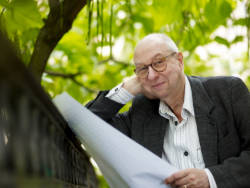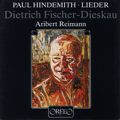ORFEO International
News
March 2016
Aribert Reimann 80th Anniversary
Aribert Reimann, who celebrated his 80th birthday on 4 March 2016, has composed for the human voice in a manner unmatched by any other in the 20th and 21st centuries. From his early songs when he was 10 years old to the remarkable world première of his opera Medea in Vienna in 2010, Reimann has explored the possibilities of singing and of vocal expression in a manner that is highly virtuosic and complex but unmistakeably his own, whether it be in the small-scale form of the song with piano, for voice with string quartet accompaniment, in his Requiem or in the large-scale format of his operas. No matter what demands he makes, Reimann never writes against the voice. His vocal parts are always saturated with manifold expression, as is even the case in the vocalises that he wrote for the different voices in the semi-finals of the ARD Music Competition. Lear, with Dietrich Fischer-Dieskau and Júlia Várady, brought the composer his breakthrough when it was first performed at the Bavarian State Opera in 1978. 
Aribert Reimann
Foto: Schott Promotion: Gaby GersterIt was later played in many other houses, and was the first of seven evening-long works of music theatre that include works based on Kafka’s Castle, Euripides’s Troades and Federico Garcia Lorca’s House of Bernarda Alba. Throughout his career, Reimann has composed numerous songs to demanding poetry such as that of Eichendorff, Lord Byron, Paul Celan, James Joyce, Nicolas Born and Sylvia Plath – and this is documented not least on the CDs of the “Zeitgenössisches Lied” edition (“Contemporary Song”), which Reimann released on the Orfeo label. It further includes songs by Webern, Dessau, Eisler, Hindemith, Prokofiev, Krenek, Reutter and Rihm. The composer here also offered an “accompaniment” in an emphatic sense, in the guise of a constructive collaborator on the piano, partnering great singers such as Elisabeth Grümmer, Brigitte Fassbaender and Dietrich Fischer-Dieskau. Also on the Orfeo label, Reimann provided Fischer-Dieskau with a highly subtle, colourful accompaniment on the fortepiano in songs by Friedrich Zelter, the composer whom Goethe admired so much, and – back on the modern concert grand – in little-known songs from the 20th century to texts by Richard Dehmel. And together with Júlia Várady, Reimann embarked on a fascinating voyage of discovery of the songs of Piotr Tchaikovsky, which are also so rarely heard here in western Europe.

C 212 901 A
C 156 861 A
C 097 841 A
C 390 951 B
top |